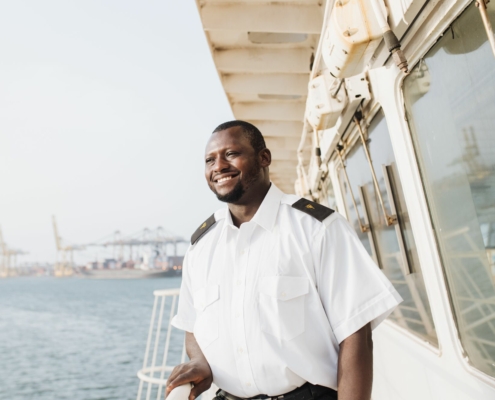Bridging the Gap of Anesthesia Care in Guinea
For Marthe Lamah, becoming an anesthetist was a life-long dream.
“Since I was little, I always liked to help vulnerable people,” she says – and she believed patients receiving surgery in the operating room were among the most vulnerable of all. “I understood immediately that there is a specialty where you could take care of this type of vulnerable people with proper training in place.”
Right now, Marthe is one of more than 20 students studying to become a nurse anesthetist in Guinea’s Gamal Abdel Nasser University. At the front of the classroom is Professor Joseph Donamou, the catalyst behind the program.
This nurse anesthesia training program is a first of its kind in Guinea. Normally, students desiring to specialize in anesthesia must find the funds and opportunity to travel abroad and earn their degrees. Often, due to a lack of opportunities at home, students choose not to return to Guinea after graduating. Over time, this has created a dearth of specialists to provide critical anesthesia care during surgery.
A New Dream Begins in Guinea
Things began to change when Prof. Donamou, a medical doctor specializing in anesthesia, boarded the Africa Mercy® for surgeon mentoring in 2018. The mentorship itself was brief, only lasting only two weeks. Yet his wheels started spinning.
What if he could take the concept of a training course, but apply it over years instead of weeks? What if he could spearhead the type of education in Guinea that would enable students to learn without leaving the country?
He brought his idea to his peers at Mercy Ships, telling them, “There’s a need. This has to happen.”
Shortly afterwards, the nurse anesthesia training program was born at Gamal University. Mercy Ships provided an initial donation of textbooks and simulation equipment, and then renovated a bigger space for training.
It started slowly – but before long, the program picked up steam.
“We started with 4 students, and then 5 students, then 19… and today, we have 23.”
Among these are nurses from across Guinea, with the intention that they will improve anesthesia coverage throughout the country.
A large part of the program’s success is the opportunity it gives students to put their theoretical knowledge into practice.
“Students do a lot of simulation in class, and when they get to the operating room, they’re not strangers because they already know what’s going to happen. In the Guinean context it’s hard to find this, it’s something new that we are putting into practice. What we’ve seen is that when a student does the practice and the simulation, when they get to the OR, they quickly adapt and they do the procedure well,” explained Prof. Donamou.

Expanding the Program’s Scope
Even with the nurse anesthesia program growing, Prof. Donamou recognized a severe lack of medical doctor anesthetists. Currently, there are 12 medical doctor anesthetists responsible for providing care for a population of more than 13 million people.
In the past, this lack of specialists has had life-threatening implications.
“People were trained on the job, and this was characterized by a very high mortality related to anesthesia. Not because of the surgery but by the anesthesia, because the anesthesia was badly done. There were many patients who died because the anesthesia was not well done,” said Prof. Donamou.
In order to meet this need and start a five-year medical doctor anesthesia program, Prof. Donamou earned his professorship with the support of Mercy Ships. This made him the very first anesthesia professor in the country.
This year, in addition to the 20-plus nurse anesthesia students, Mercy Ships is sponsoring a total of 8 medical doctor anesthetists. Once they’re certified, this will nearly double the country’s current workforce, allowing more people all across the nation to benefit from quality care.
“Our hope is that 10 years from now, those who have been trained will be assigned into upcountry as well as the capital hospitals to help improve the care of patients in the operating room,” shared Dr. Abdoulaye Toure, an assistant teacher in the program.
Life-Saving Results
In the few years it’s been running, the program has already seen tangible results in Guinea’s surgical care. Previously, more than 90% of scheduled cesarean sections in the country were performed under general anesthesia without oxygen, instead of under spinal anesthesia as in many other parts of the world.
“The consequence is that there is a high rate of maternal-fetal mortality. That is to say, there are mothers who die from this inappropriate anesthesia, and there are also children who die. The women who came to give birth by caesarean section, many of them lost either their babies or lost their lives,” said Prof. Donamou.
However, since the program began in 2019, Prof. Donamou says, “we have started to change this trend.”
All C-sections are now performed under spinal anesthesia. He says this has significantly reduced the maternal-fetal mortality rate: “Now, it is rare to see a woman die during a caesarean surgery.”
For Marthe, the dream now goes beyond simply working as an anesthetist. She wants to bring her training home to the remote areas of Guinea, where the need for specialized care is the greatest: “Guinea is my nation, my land. My goal is to go upcountry to help them, sharing the knowledge that I have acquired here with people living in the interior.”
Watching students like Marthe and many others excel in the classroom, Prof. Donamou says the future is looking bright in Guinea. “I’m very proud of what’s happening here, because from where we left to where we are today, we’ve come a long way. I know the future will be much better because of what is happening here today.”
Your support makes surgical education programs like these possible. Want to see the impact of long-term partnership in action? Visit mercyships.org today.









